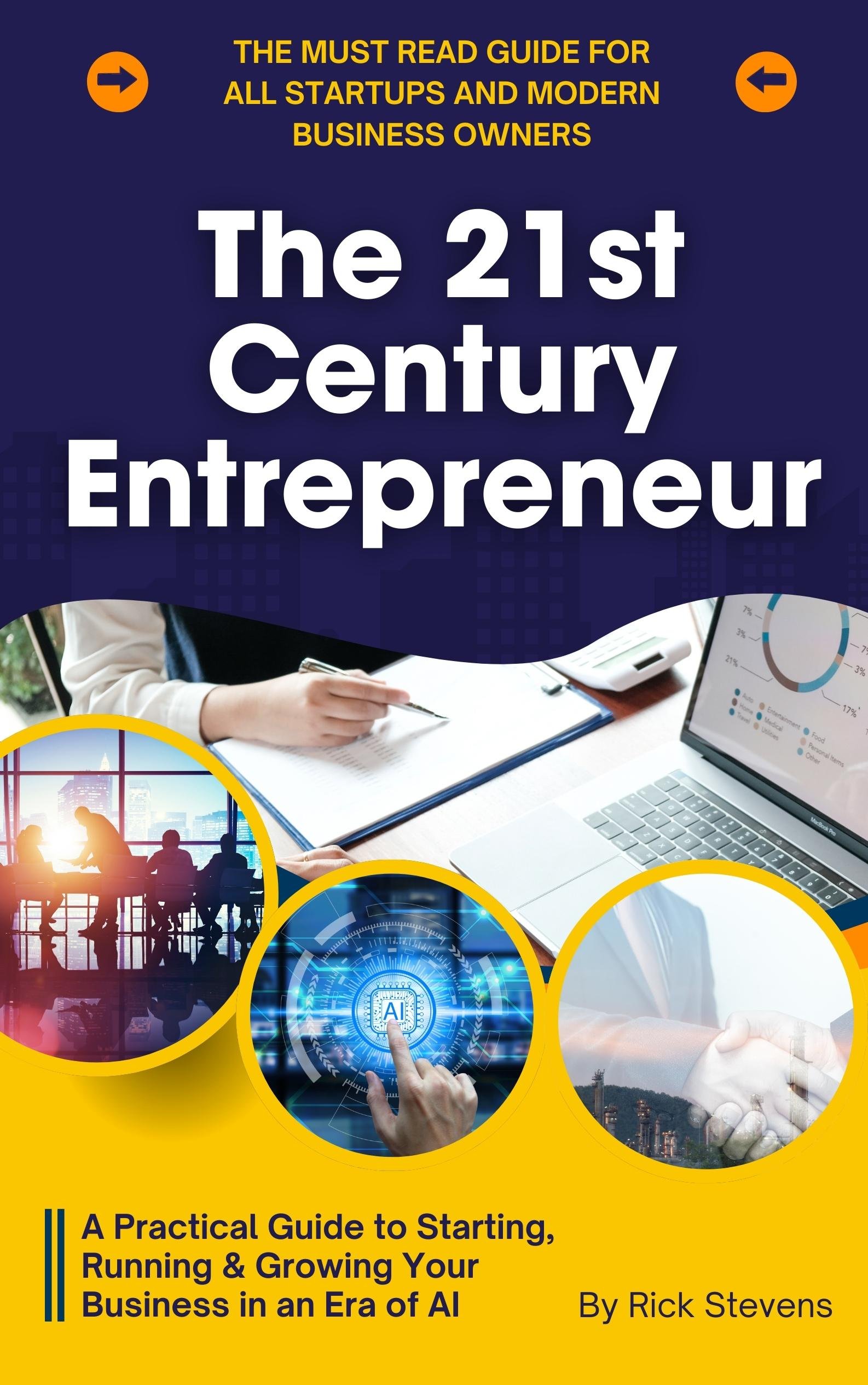Are you an aspiring entrepreneur looking for books that will equip you with the knowledge and mindset you need to succeed in the business world? Look no further! In this article, we will introduce you to two must-read entrepreneur books that are sure to inspire and guide you on your entrepreneurial journey.
Book #1: “The 21st Century Entrepreneur” by Rick Stevens. In this book, designed for startup and growing businesses, the author talks about his 30 years experience as a successful entrepreneur and shares his timeless lessons in business through the ups and downs whilst combining these timeless practices and his lessons learned with the latest in how technology is enabling entrepreneurs to grow their businesses at far faster rates than when he started. With practical go to tips on how to harness the power of AI to your advantage in your startup or growing business.
Book #2: “Healthy Mind Healthy Profits”, the second of our entrepreneur books and also by Rick Stevens, In this game-changing book, Stevens shares the depths of his mental health journey through his career and especially a he entered corporate leadership. Not only has Stevens been a successful entrepreneur but he has also been at the helm steering some of the largest corporate organisations from the very top. He breaks the sector silence about the mental health challenges that leaders face and talks in depth at a very personal level about the importance of recognising out limits as entrepreneurs, managers and leaders and adopting a positive approach towards mental health throughout organisations, not only as it´s the right thing to do but in doing so he shares how it can increase productivity , performance and bring out the very best in ourselves and our teams.
Get ready to enhance your entrepreneurial skills and unleash your potential with these two must-read books. Let’s dive in and discover the valuable insights these valuable entrepreneur books have to offer!
Book 1: “The 21st Century Entrepreneur” by Rick Stevens
“The 21st Century Entrepreneur” stands out as a guide tailored to the complexities of modern entrepreneurship. In his book, Rick Stevens draws from his extensive experience, spanning three decades, to provide readers with actionable insights that resonate with both seasoned professionals and newcomers alike. One of the key features of the book is its pragmatic approach. Stevens goes beyond theoretical concepts, offering real-world examples and case studies that illustrate the application of his principles. This makes the lessons not only relatable but also easy to implement in various business contexts.
Stevens also emphasizes the convergence of traditional business practices with modern technological advancements. He discusses how the foundational principles of entrepreneurship—such as understanding your market, knowing your customers, and maintaining financial discipline—remain relevant, but must now be complemented by a robust understanding of digital tools. This integration is crucial for entrepreneurs who wish to scale their businesses effectively. The book serves as a roadmap for navigating this duality, ensuring that readers are well-equipped to tackle both timeless and contemporary challenges.
Moreover, the book delves into the importance of networking and building relationships in the entrepreneurial landscape. Stevens highlights that success is often not just about the product or service offered but also about the connections forged along the way. He provides strategies for effective networking, including leveraging social media platforms and attending industry events. By doing so, entrepreneurs can create a supportive ecosystem that fosters collaboration and opens doors to new opportunities. This focus on relationships adds another layer of depth to Stevens’ approach, making it an essential read for anyone serious about entrepreneurship.
Key takeaways from “The 21st Century Entrepreneur”
“The 21st Century Entrepreneur” by Rick Stevens is a treasure trove of insights, particularly for those venturing into the world of startups and expanding businesses. One of the most profound takeaways from the book is the importance of adaptability. In a landscape that is constantly evolving due to technological advancements, entrepreneurs must be willing to pivot and embrace change. Stevens emphasizes that the ability to adapt one’s business model and strategies is not just beneficial; it is essential for survival in today’s fast-paced environment. This adaptability is often what distinguishes successful entrepreneurs from those who falter, as they continuously assess their surroundings and adjust their approaches accordingly.
Another critical lesson from the book is the significance of leveraging technology, particularly artificial intelligence (AI), to enhance business operations. Stevens shares practical tips on how entrepreneurs can utilize AI to streamline processes, improve customer experiences, and ultimately drive growth. He illustrates how AI can be a game-changer, providing insights that allow businesses to make data-driven decisions. By harnessing these technological tools, entrepreneurs can gain a competitive edge and position themselves for success in their respective fields.
Finally, Stevens underscores the importance of a strong entrepreneurial mindset. He discusses the mental resilience required to navigate the inevitable challenges that come with running a business. This mindset encompasses a willingness to learn from failures, remain persistent in the face of obstacles, and maintain a positive outlook. By cultivating this mindset, entrepreneurs can not only enhance their chances of success but also inspire their teams and foster a culture of innovation within their organizations.
“The 21st Century Entrepreneur” stands out as a guide tailored to the complexities of modern entrepreneurship. In his book, Rick Stevens draws from his extensive experience, spanning three decades, to provide readers with actionable insights that resonate with both seasoned professionals and newcomers alike. One of the key features of the book is its pragmatic approach. Stevens goes beyond theoretical concepts, offering real-world examples and case studies that illustrate the application of his principles. This makes the lessons not only relatable but also easy to implement in various business contexts.
Stevens also emphasizes the convergence of traditional business practices with modern technological advancements. He discusses how the foundational principles of entrepreneurship—such as understanding your market, knowing your customers, and maintaining financial discipline—remain relevant, but must now be complemented by a robust understanding of digital tools. This integration is crucial for entrepreneurs who wish to scale their businesses effectively. The book serves as a roadmap for navigating this duality, ensuring that readers are well-equipped to tackle both timeless and contemporary challenges.
Moreover, the book delves into the importance of networking and building relationships in the entrepreneurial landscape. Stevens highlights that success is often not just about the product or service offered but also about the connections forged along the way. He provides strategies for effective networking, including leveraging social media platforms and attending industry events. By doing so, entrepreneurs can create a supportive ecosystem that fosters collaboration and opens doors to new opportunities. This focus on relationships adds another layer of depth to Stevens’ approach, making it an essential read for anyone serious about entrepreneurship.


Book 2: “Healthy Mind Healthy Profits” by Rick Stevens
“Healthy Mind Healthy Profits” is a poignant exploration of the often-overlooked aspect of entrepreneurship: mental health. In this ground-breaking book, Rick Stevens shares his personal journey with mental health, particularly as he ascended to corporate leadership roles. He bravely addresses the stigma surrounding mental health issues in the business world, particularly in high-stress environments. This transparency is refreshing and serves as a wake-up call for leaders to prioritize their mental well-being and that of their teams.
One of the core messages of the book is the necessity of recognizing one’s limits. Stevens emphasizes that entrepreneurs and leaders often push themselves to the brink, believing that relentless work is the path to success. However, he argues that this mindset can lead to burnout and decreased productivity. By acknowledging the signs of stress and fatigue, leaders can take proactive steps to care for their mental health, ultimately leading to better decision-making and a healthier work environment. Stevens provides practical strategies for fostering mental resilience, such as mindfulness practices and regular self-reflection.
Additionally, the book outlines the tangible benefits of promoting mental health within organizations. Stevens presents compelling evidence that prioritizing mental well-being can lead to increased productivity, lower turnover rates, and a more engaged workforce. He encourages leaders to create a culture that values mental health, offering resources and support systems for employees. By doing so, organizations not only fulfill a moral obligation but also enhance their overall performance and success. “Healthy Mind Healthy Profits” is a crucial read for anyone in a leadership position, highlighting the intersection of mental health and business success.

Additional recommended books for entrepreneurs
In addition to Rick Stevens’ insightful works, there are several other books that aspiring entrepreneurs should consider adding to their reading list. One such book is “The Lean Startup” by Eric Ries. This book revolutionizes the way entrepreneurs approach business development by introducing the concept of validated learning. Ries advocates for a scientific approach to creating and managing successful startups, emphasizing the importance of iterative product releases and customer feedback. This methodology allows entrepreneurs to minimize risk and maximize their chances of success in a competitive market.
Another noteworthy recommendation is “Start with Why” by Simon Sinek. In this thought-provoking book, Sinek explores the idea that successful leaders and organizations inspire action by articulating a clear sense of purpose. He introduces the concept of the “Golden Circle,” which emphasizes the importance of starting with the “why” before addressing the “how” and “what.” This perspective encourages entrepreneurs to connect with their audience on a deeper level, fostering loyalty and engagement. By understanding and communicating their core mission, entrepreneurs can build enduring brands that resonate with customers.
Lastly, “Good to Great” by Jim Collins is a must-read for those seeking to elevate their businesses. Collins and his research team analyze why some companies transition from being good to becoming truly great. The book presents key concepts, such as the Hedgehog Concept and the Flywheel Effect, that can guide entrepreneurs in making strategic decisions. By studying the characteristics of successful companies, readers can glean valuable insights into the principles that drive sustained excellence, making it an essential addition to any entrepreneur’s library.
Benefits of reading entrepreneur books for personal and professional growth
Reading has long been recognized as a powerful tool for personal and professional growth, particularly for entrepreneurs. One of the primary benefits of reading entrepreneur books is the acquisition of knowledge. By immersing themselves in books, entrepreneurs can explore new ideas, concepts, and strategies that can be directly applied to their businesses. This continuous learning mindset is crucial in an ever-evolving landscape, allowing entrepreneurs to stay ahead of industry trends and make informed decisions.
Moreover, reading fosters critical thinking and problem-solving skills. Engaging with diverse perspectives and narratives challenges entrepreneurs to analyze situations from various angles. This cognitive exercise enhances their ability to approach problems creatively and develop innovative solutions. As they encounter different scenarios and case studies in their reading, entrepreneurs can draw parallels to their own experiences, equipping themselves with the tools needed to tackle challenges effectively.
Additionally, reading can serve as a source of inspiration and motivation. Many entrepreneurs face moments of doubt and uncertainty, and entrepreneur books can provide the encouragement needed to persevere. Stories of successful entrepreneurs overcoming obstacles can reignite one’s passion and commitment to their goals. Furthermore, reading, especially inspiring entrepreneur books can also offer a sense of community, as individuals connect with authors and fellow readers who share similar aspirations. This sense of belonging can be incredibly valuable, fostering a supportive network that encourages growth and resilience.
How to incorporate reading into your daily routine as an entrepreneur
Incorporating reading entrepreneur books or any written material into a busy entrepreneurial schedule may seem daunting, but with intentional planning, it can become a rewarding habit. One effective strategy is to set aside dedicated time for reading each day and building up a selection of entrepreneur books to work through. Whether it’s in the morning, during lunch breaks, or before bedtime, establishing a specific time can help create a routine. Entrepreneurs can start with just 15 to 30 minutes a day, gradually increasing the duration as they become more accustomed to this practice. This commitment allows them to consistently engage with new material and integrate learning into their daily lives.

Another approach is to leverage technology to facilitate reading. Audiobooks and e-readers provide convenient options for busy entrepreneurs who may find it challenging to sit down with a physical book. Listening to audiobooks during commutes or while exercising can make it easier to consume content without sacrificing time. E-readers also offer the advantage of portability, allowing entrepreneurs to carry multiple books with them and read whenever they have a spare moment. This flexibility can significantly enhance one’s ability to read more frequently.
Additionally, entrepreneurs can join or create a book club focused on business literature. This collaborative approach not only encourages accountability but also fosters engaging discussions that can deepen understanding of the material. By sharing insights and perspectives with fellow entrepreneurs, individuals can gain new viewpoints and develop a richer comprehension of the concepts presented in the books. This communal experience can make reading a more enjoyable and enriching endeavour, further motivating individuals to prioritize it in their routine.
Conclusion and final thoughts on the impact of reading for entrepreneurs
In conclusion, the journey of entrepreneurship is multifaceted, requiring a blend of knowledge, resilience, and adaptability. The insights gleaned from entrepreneur books such as “The 21st Century Entrepreneur” and “Healthy Mind Healthy Profits” by Rick Stevens equip aspiring entrepreneurs with essential tools to navigate the complexities of their ventures. By understanding the importance of adaptability, leveraging technology, and prioritizing mental health, individuals can cultivate a strong foundation for success in their entrepreneurial endeavours.
Moreover, the act of reading itself serves as a catalyst for personal and professional growth. By dedicating time to explore diverse perspectives and ideas, entrepreneurs can enhance their knowledge, critical thinking skills, and motivation. The recommendations offered throughout this article, along with actionable strategies for incorporating reading into daily routines, empower individuals to make reading an integral part of their entrepreneurial journey.
Ultimately, the impact of reading on entrepreneurship extends beyond knowledge acquisition; it fosters a mindset of continuous learning and growth. In a world that is constantly changing, the ability to adapt, innovate, and lead with purpose is paramount. As aspiring entrepreneurs embark on their journeys, they should embrace the power of reading as a valuable resource that can inspire, inform, and transform their paths to success.
You can read more about the author of these entrepreneur books, Rick Stevens here.






